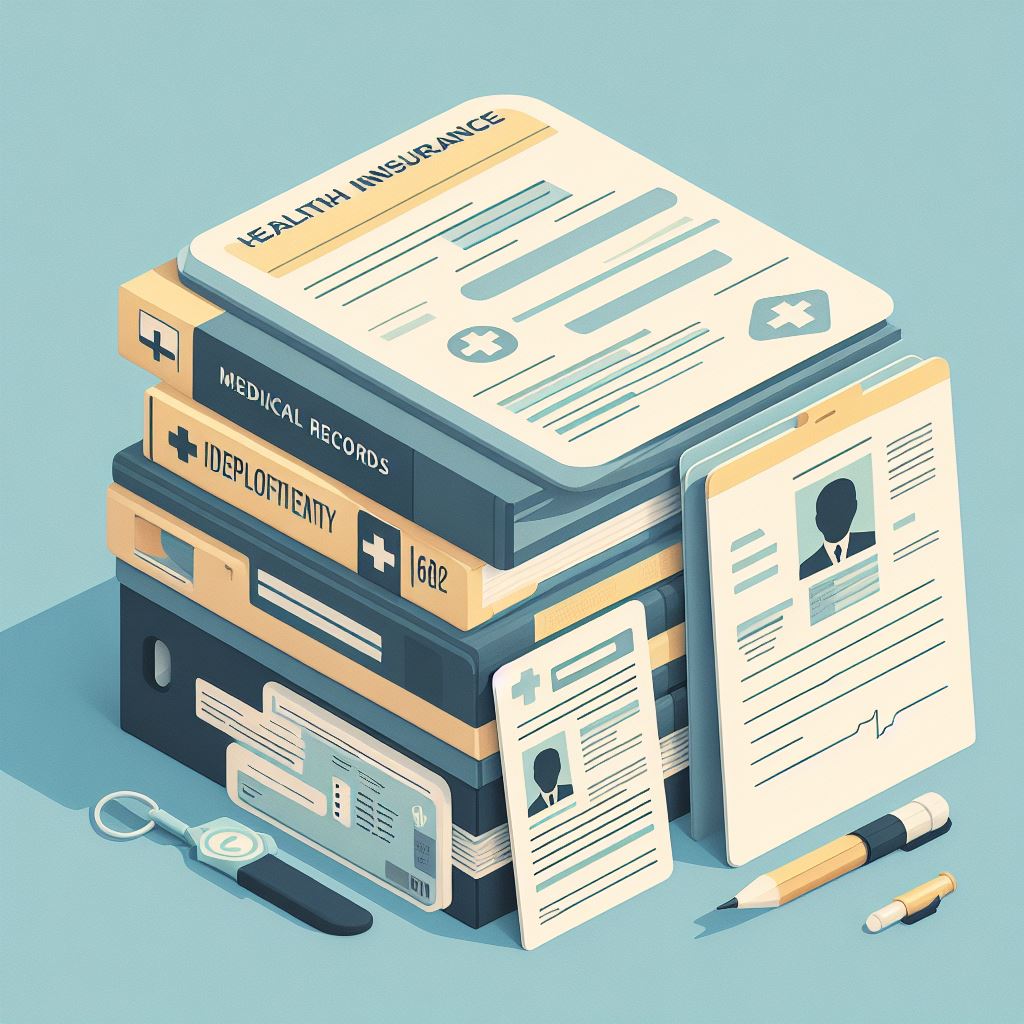Comprehensive Guide: Health Insurance Application Documents

Are you overwhelmed with the process of applying for health insurance? Don’t worry, we’ve got you covered.
In this comprehensive guide, we will walk you through the essential documents you need to gather and submit to ensure a smooth application process. From proof of identity to employment and income verification, we will provide clear and detailed instructions to help you navigate through the maze of paperwork.
So, let’s get started and simplify the application process for you.
Key Takeaways
- Valid form of identification is required for a health insurance application, such as a driver’s license, passport, or national identity card.
- Basic personal information, including full name, date of birth, gender, address, phone number, and email address, is necessary for the application.
- Financial documentation, such as recent tax returns, pay stubs, and documentation of assets, is needed to determine eligibility and financial assistance.
- Employment and income verification can be provided through pay stubs, W-2 forms, tax returns, employer verification letters, or bank statements showing regular income deposits.
Proof of Identity
To prove your identity when applying for health insurance, you’ll need to provide a valid form of identification. This is a crucial step in the application process, as it ensures that the insurance company can accurately verify your identity and prevent fraud.
When submitting your application, you’ll be required to provide a copy of a government-issued identification document, such as a driver’s license, passport, or national identity card. It’s important to ensure that the identification document you provide is current and not expired. Additionally, the document should contain your full legal name, date of birth, and a clear photograph of your face.
This information will be used to verify your identity against the details you have provided in your application. It’s essential to double-check the accuracy of the information on your identification document before submitting it to avoid any delays or complications in the application process.
Personal Information
When applying for health insurance, you’ll frequently need to provide personal information to complete the application process. This information includes your full name, date of birth, gender, address, phone number, and email address. It’s important to provide accurate and up-to-date information to ensure that your application is processed correctly.
In addition to these basic details, health insurance applications often require you to provide information about your marital status, citizenship status, and social security number. You may also be asked about your occupation and employer information. These details help insurance companies determine your eligibility and calculate your premiums.
Furthermore, you may need to provide information about your dependents, such as their names, dates of birth, and relationship to you. This is important if you’re applying for family coverage or if you have children who are eligible for certain benefits.
Remember to review the application carefully before submitting it to ensure that all personal information is accurate and complete. Any errors or omissions could delay the processing of your application.
Now that you have provided your personal information, the next step in the health insurance application process is to gather your financial documentation.
Financial Documentation
Gather your financial records when applying for health insurance to provide the necessary documentation. Financial documentation is crucial for determining your eligibility and calculating the amount of financial assistance you may qualify for.
Start by collecting your recent tax returns, including W-2 forms or 1099 forms if applicable. These documents provide a comprehensive overview of your income and can help establish your financial status.
In addition to tax returns, gather your pay stubs or other proof of income for the past few months. This will help the insurance provider assess your current income level and determine how much you can afford to pay for premiums. It’s important to include all sources of income, such as wages, self-employment earnings, rental income, and any other forms of regular income.
Furthermore, you may need to provide documentation of your assets, such as bank statements, investment account statements, or property ownership documents. These records give a clearer picture of your financial situation and can assist in determining your eligibility for certain health insurance programs.
By organizing and providing accurate financial documentation, you can ensure a smooth application process and receive the appropriate health insurance coverage. Once you have gathered your financial records, the next step is to verify your employment and income, which will be discussed in the following section.
Transition Sentence: Now that you have gathered your financial documentation, it’s time to move on to the next step: employment and income verification.
Employment and Income Verification
Now that you have organized your financial documentation, how can you verify your employment and income for your health insurance application? Here are five ways to do it:
- Pay stubs: Provide recent pay stubs that show your income and employment details. Make sure they include your name, employer’s name, and pay period.
- W-2 forms: Submit your W-2 forms from the previous tax year, which provide a summary of your earnings and taxes withheld. These forms are typically issued by your employer.
- Tax returns: Include copies of your federal income tax returns for the past two years. This will give the insurance company a comprehensive view of your income and employment history.
- Employer verification letter: Request a letter from your employer that confirms your employment status, position, and income. The letter should be on company letterhead and include contact information for verification purposes.
- Bank statements: Provide bank statements that show regular deposits of your income. This can be an alternative way to verify your employment and income if you’re self-employed or have irregular pay.
Additional Supporting Documents
To further support your health insurance application, you’ll need to provide additional documents. These documents serve to verify certain information and ensure that your application is complete.
One important document you may need to submit is proof of residency, such as a utility bill or lease agreement, to establish that you live in the coverage area. Additionally, you may be required to provide proof of citizenship or legal residency, which can be done through a birth certificate, passport, or immigration documents. If you’re applying for coverage as a dependent, you’ll need to provide documents that establish your relationship to the primary policyholder, such as a marriage certificate or adoption papers.
Furthermore, you may need to submit supporting documents for specific circumstances. For example, if you have a pre-existing condition, you may be asked to provide medical records or a letter from your physician. If you’re a student, you may need to provide proof of enrollment, such as a letter from your school.
It’s important to carefully review the application requirements and gather all necessary documents to avoid delays in the processing of your health insurance application.
Frequently Asked Questions
Are There Any Specific Requirements for Proof of Identity When Applying for Health Insurance?
When applying for health insurance, you need to provide proof of identity. This is a specific requirement and helps ensure that the information provided is accurate and secure.
How Long Does It Typically Take for a Health Insurance Application to Be Processed?
On average, it takes about two to four weeks for a health insurance application to be processed. However, this timeline can vary depending on the complexity of your application and the efficiency of the insurance provider.
Can I Submit Electronic Copies of My Financial Documentation, or Do They Need to Be Physical Copies?
You can submit electronic copies of your financial documentation for your health insurance application. They don’t need to be physical copies. This makes the application process more convenient and efficient for you.
What Types of Employment and Income Verification Documents Are Typically Accepted by Health Insurance Companies?
Typically accepted employment and income verification documents by health insurance companies include pay stubs, tax returns, and W-2 forms. These documents provide proof of your income and help determine your eligibility for health insurance coverage.
Are There Any Additional Supporting Documents That May Be Required for Specific Health Insurance Plans or Coverage Options?
For specific health insurance plans or coverage options, additional supporting documents may be required. These documents vary depending on the plan, so it’s important to check with your insurance provider for a complete list.



